
LOADING ...
In response to evolving domestic opinion, eMedals Inc has made the conscious decision to remove the presentation of German Third Reich historical artifacts from our online catalogue. For three decades, eMedals Inc has made an effort to preserve history in all its forms. As historians and researchers, we have managed sensitive articles and materials with the greatest of care and respect for their past and present social context. We acknowledge the growing sentiments put forth by the Canadian public and have taken proactive actions to address this opinion.
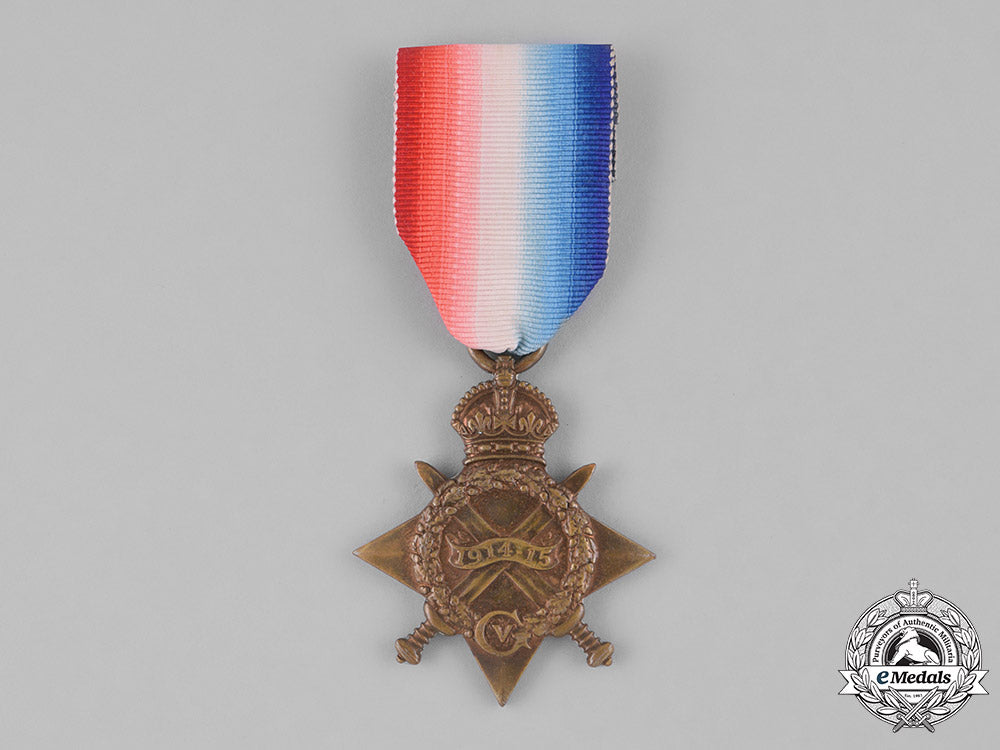
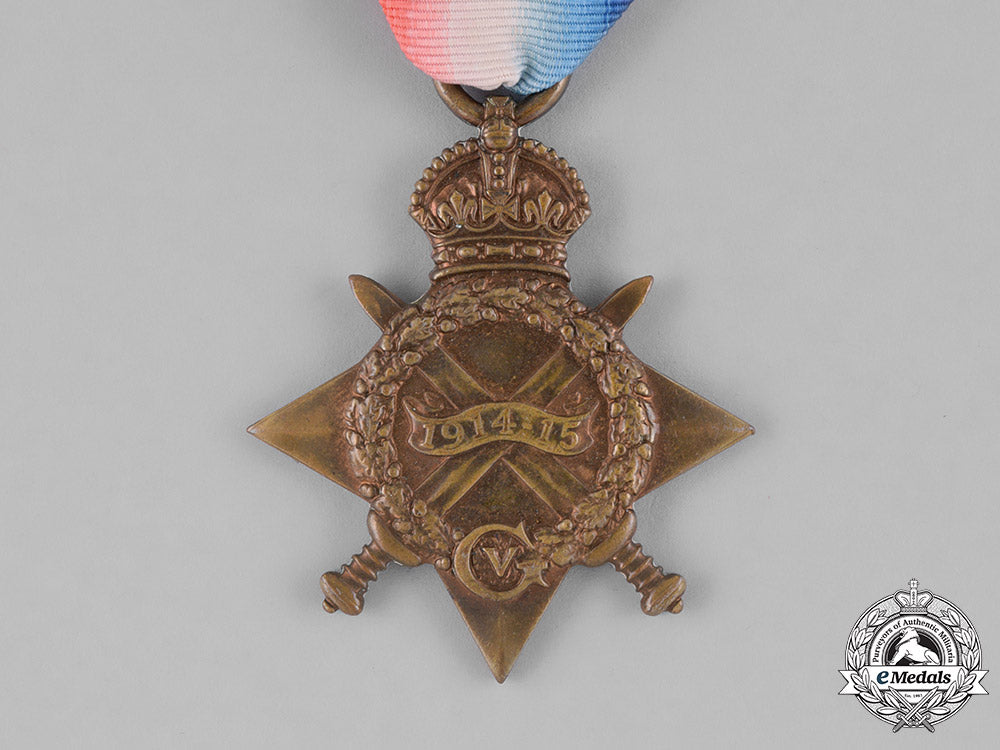
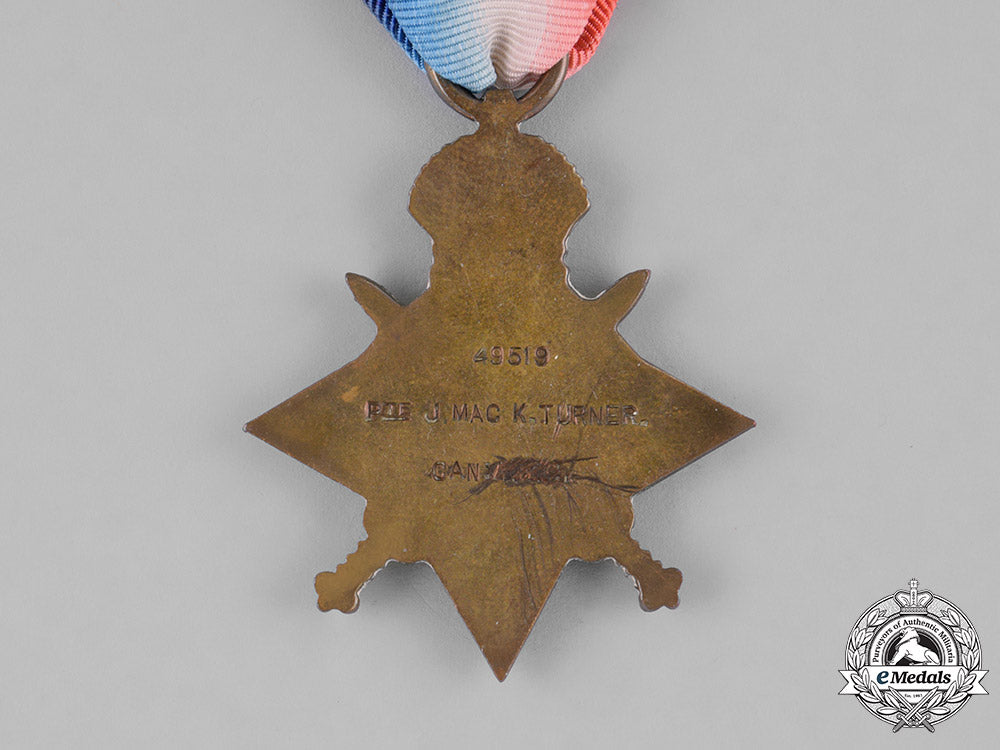
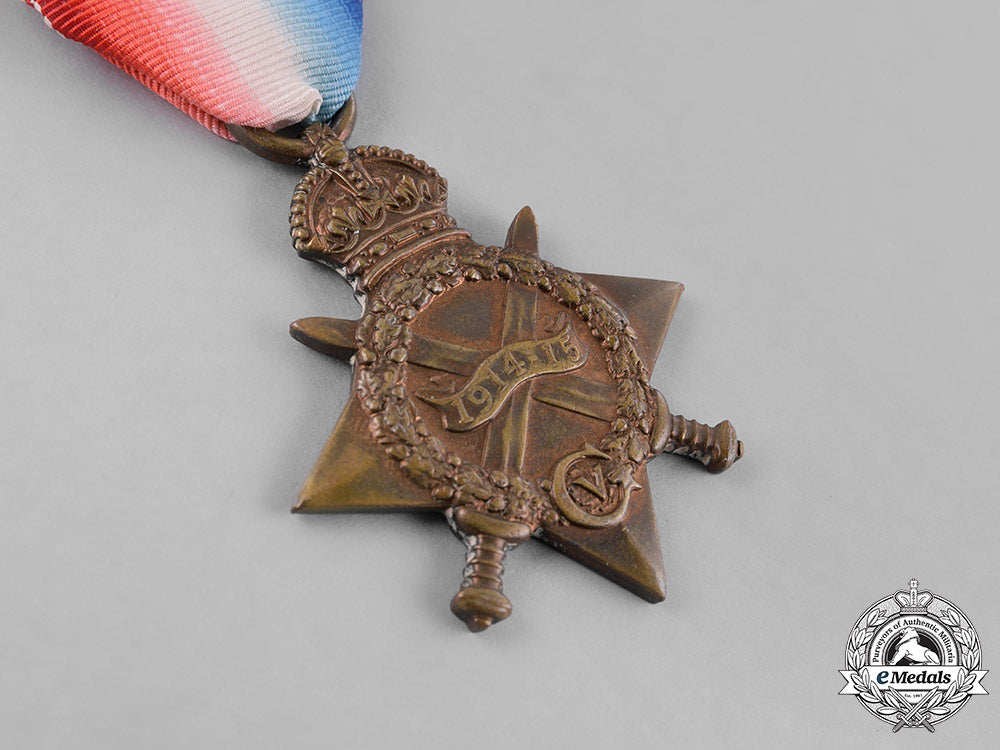
Canada. A 1914-15 Star, Mobile Veterinary Section, Canadian Army Service Corps
Canada. A 1914-15 Star, Mobile Veterinary Section, Canadian Army Service Corps
SKU: ITEM: C5537
Current Bid:
Your Max Bid:
Bid History:
Time Remaining:
Couldn't load pickup availability
Shipping Details
Shipping Details
eMedals offers rapid domestic and international shipping. Orders received prior to 12:00pm (EST) will be shipped on the same business day.* Orders placed on Canadian Federal holidays will be dispatched the subsequent business day. Courier tracking numbers are provided for all shipments. All items purchased from eMedals can be returned for a full monetary refund or merchandise credit, providing the criteria presented in our Terms & Conditions are met. *Please note that the addition of a COA may impact dispatch time.
Shipping Details
eMedals offers rapid domestic and international shipping. Orders received prior to 12:00pm (EST) will be shipped on the same business day.* Orders placed on Canadian Federal holidays will be dispatched the subsequent business day. Courier tracking numbers are provided for all shipments. All items purchased from eMedals can be returned for a full monetary refund or merchandise credit, providing the criteria presented in our Terms & Conditions are met. *Please note that the addition of a COA may impact dispatch time.
Description
Description
(49519 Pte L. MAC K. TURNER. CAN: A.S.C.). Naming is officially impressed, with an attempt to erase the "A.S.C." designation. Very light contact, scratches evident on the reverse from the name erasing, replacement ribbon, fine.
Footnote: James MacKinney Turner is listed as having two birth dates: February 2, 1888 and May 2, 1888. He signed his first Attestation Paper as a Private (79624) with the 31st Infantry Battalion "Alberta Regiment", on November 18, 1914 in Claresholm, Alberta, at the age of 26, naming his next-of-kin as his father, Thomas Turner of Edinburgh, Scotland, stating that he was born on May 2, 1888 in Edinburgh, that he had three years' previous service with the Queens Rifles, twenty-seven days with the 18th Mounted Rifles, one year with the Army Service Corps, that he was not married, that his religion was Presbyterian and that his trade was that of Carpenter. However, Turner was struck off strength of the 31st Infantry Battalion at Calgary, Alberta on April 6, 1915, a little over four and a half months after enlisting, as he had become "Indifferent, (and) has been guilty of several offences of 'absence' and 'drunkenness' ", and was subsequently categorized as "not likely to become an efficient soldier". This did not stop Tuner's desire to become a member of the Canadian Expeditionary Force, as he signed his second Attestation Paper the day after he was released from the 31st Infantry Battalion, this time as a Private (49519) with 101 Squadron at the Canadian Remount Depot, Canadian Army Service Corps, on April 7, 1915 in Calgary, Alberta, at the age of 27, naming his next of kin as his mother, Jane Turner of Edinburgh, Scotland, stating that he was born on February 2, 1888 in MacDuff, Scotland, stating that he had previous service with the Imperial Army Service Corps, that he was not married, that his religion was Presbyterian and that his trade was that of Cabinet Maker. He soon made his way to England with the Canadian Army Service Corps. After a brief stay in England, he embarked Southampton on June 4, 1915, arriving at the Base Depot in France on June 5th and joining his unit in the field on June 31st. Private Turner's ability to run afoul of the authorities, as evidenced during his brief tenure with the 31st Infantry Battalion, would continue throughout his service overseas, as he was issued multiple punishments on six occasions. He was stationed at Hautot when he was sentenced to 7 days' Confinement to Base on November 4, 1915, for taking a horse without permission and for being drunk. Two and half months later while still at Hautot, he was sentenced to 7 days' Confinement to Base on January 22, 1916, for being out of bounds without a pass. Private Turner was transferred to No. 1 Canadian Veterinary Hospital on April 11, 1916. He was stationed at Le Havre, when he was sentenced to 14 days' Field Punishment No. 1 and forfeited 28 days' pay on May 28, 1916, for breaking out of camp from 9:00 a.m. to 1:55 p.m. and for being drunk on May 27th. Field Punishment No. 1 consisted of the convicted man being placed in fetters and handcuffs or similar restraints and attached to a fixed object, such as a gun wheel or a fence post, for up to two hours per day.
During the early part of the First World War, the punishment was often applied with the arms stretched out and the legs tied together, giving rise to the nickname "crucifixion". The following month and still at Le Havre, he was sentenced to 14 days' Confinement to Base and forfeited 14 days' pay on June 22, 1916, for (i) breaking out of camp at 6:30 a.m. on June 20th and (ii) being Absent Without Leave from 6:30 a.m. on June 20th to 7:50 p.m. on June 21st and forfeited 2 days' pay under R.W. Another month would elapse before he would commit his fifth violation, as he was sentenced to 14 days' Confinement to Base, 28 days' forfeiture of pay and one days' pay under R.W. on July 27, 1916, for breaking out of camp and being Absent Without Leave from 2:00 p.m. to 10:30 p.m. the day before. One week after having committed his fifth offence, Private Turner was transferred to No. 4 Mobile Veterinary Section on August 2, 1916. In the Spring of 1917, he was serving with "A" Mobile Veterinary Section, when he was admitted to No. 7 Canadian Cavalry Brigade Field Ambulance on April 26, 1917 with a case of "Neuritis" (inflammation of a peripheral nerve or nerves, usually causing pain and loss of function) and after three days' treatment, was discharged to duty on the 29th. Two months later, he was admitted to the Secunderabad Indian Corps Field Ambulance on June 29, 1917, initially diagnosed as "N.Y.D." (Not Yet Determined), but upon further examination, it was determined that he had a contusion to his chest wall, his records not indicating as to the what caused it. He would remain with the Secunderabad Indian Corps Field Ambulance until July 4th, when he was discharged from hospitalization. In the Fall of 1918, Private Turner was admitted "sick" to No. 7 Canadian Field Ambulance on October 19, 1918, then transferred to No. 18 Casualty Clearing Station. His condition worsened, necessitating his transfer and admission to No. 4 General Hospital at Camiers on October 28th, where he was diagnosed with a case of "Influenza". He was invalided to England, where he was admitted to the Northampton War Hospital at Duston on November 6th, with a "pain in his right chest" and a "night cough".
By November 14th, he had shown improvement, the attending physician noting that Turner now had a "slight cough". After two weeks' treatment at Duston, he was transferred and admitted to the Canadian Convalescent Hospital at Woodcote Park, Epsom on November 19th. His recuperation period at Epsom would entail thirty days, until December 18th, when he was discharged from hospitalization and placed on command to the Canadian Convalescent Depot at Witley. Private Turner's sixth and final violation occurred over a five day period, as he was awarded three days' Field Punishment No. 2 and forfeited five days' pay on January 7, 1919, for being Absent Without Leave from 7:00 p.m. on December 30, 1918 to 7:00 p.m. on January 4, 1919. Field Punishment No. 2 involved the sentenced soldier being placed in fetters and handcuffs but was not attached to a fixed object, as per Field Punishment No. 1. This allowed a soldier to still be able to march with his unit and was a relatively tolerable punishment. He was posted to the Canadian Army Veterinary Corps Base Depot on January 25, 1919, then posted to the General Depot at Witley on February 12, 1919, followed by his final overseas posting to Military District No. 13, "C" Wing at the Canadian Concentration Camp at Kinmel Park, Rhyl, North Wales, on February 22, 1919, pending return to Canada. He left for home, embarking Liverpool, England aboard the HMT Celtic on March 10, 1919, arriving in Halifax, Nova Scotia on the 18th. Private James MacKinney Turner, Mobile Veterinary Section, Canadian Army Service Corps was discharged upon demobilization at Dispersal Station "R", Military District No. 13 in Calgary, on March 24, 1919, credited with having served in Canada, England and France, entitled to wear the War Service Badge, Class "A", number 69964. For his First World War service, he was awarded the 1914-15 Star, the British War Medal and the Victory Medal. He died on June 7, 1960, at the age of 72.
Description
(49519 Pte L. MAC K. TURNER. CAN: A.S.C.). Naming is officially impressed, with an attempt to erase the "A.S.C." designation. Very light contact, scratches evident on the reverse from the name erasing, replacement ribbon, fine.
Footnote: James MacKinney Turner is listed as having two birth dates: February 2, 1888 and May 2, 1888. He signed his first Attestation Paper as a Private (79624) with the 31st Infantry Battalion "Alberta Regiment", on November 18, 1914 in Claresholm, Alberta, at the age of 26, naming his next-of-kin as his father, Thomas Turner of Edinburgh, Scotland, stating that he was born on May 2, 1888 in Edinburgh, that he had three years' previous service with the Queens Rifles, twenty-seven days with the 18th Mounted Rifles, one year with the Army Service Corps, that he was not married, that his religion was Presbyterian and that his trade was that of Carpenter. However, Turner was struck off strength of the 31st Infantry Battalion at Calgary, Alberta on April 6, 1915, a little over four and a half months after enlisting, as he had become "Indifferent, (and) has been guilty of several offences of 'absence' and 'drunkenness' ", and was subsequently categorized as "not likely to become an efficient soldier". This did not stop Tuner's desire to become a member of the Canadian Expeditionary Force, as he signed his second Attestation Paper the day after he was released from the 31st Infantry Battalion, this time as a Private (49519) with 101 Squadron at the Canadian Remount Depot, Canadian Army Service Corps, on April 7, 1915 in Calgary, Alberta, at the age of 27, naming his next of kin as his mother, Jane Turner of Edinburgh, Scotland, stating that he was born on February 2, 1888 in MacDuff, Scotland, stating that he had previous service with the Imperial Army Service Corps, that he was not married, that his religion was Presbyterian and that his trade was that of Cabinet Maker. He soon made his way to England with the Canadian Army Service Corps. After a brief stay in England, he embarked Southampton on June 4, 1915, arriving at the Base Depot in France on June 5th and joining his unit in the field on June 31st. Private Turner's ability to run afoul of the authorities, as evidenced during his brief tenure with the 31st Infantry Battalion, would continue throughout his service overseas, as he was issued multiple punishments on six occasions. He was stationed at Hautot when he was sentenced to 7 days' Confinement to Base on November 4, 1915, for taking a horse without permission and for being drunk. Two and half months later while still at Hautot, he was sentenced to 7 days' Confinement to Base on January 22, 1916, for being out of bounds without a pass. Private Turner was transferred to No. 1 Canadian Veterinary Hospital on April 11, 1916. He was stationed at Le Havre, when he was sentenced to 14 days' Field Punishment No. 1 and forfeited 28 days' pay on May 28, 1916, for breaking out of camp from 9:00 a.m. to 1:55 p.m. and for being drunk on May 27th. Field Punishment No. 1 consisted of the convicted man being placed in fetters and handcuffs or similar restraints and attached to a fixed object, such as a gun wheel or a fence post, for up to two hours per day.
During the early part of the First World War, the punishment was often applied with the arms stretched out and the legs tied together, giving rise to the nickname "crucifixion". The following month and still at Le Havre, he was sentenced to 14 days' Confinement to Base and forfeited 14 days' pay on June 22, 1916, for (i) breaking out of camp at 6:30 a.m. on June 20th and (ii) being Absent Without Leave from 6:30 a.m. on June 20th to 7:50 p.m. on June 21st and forfeited 2 days' pay under R.W. Another month would elapse before he would commit his fifth violation, as he was sentenced to 14 days' Confinement to Base, 28 days' forfeiture of pay and one days' pay under R.W. on July 27, 1916, for breaking out of camp and being Absent Without Leave from 2:00 p.m. to 10:30 p.m. the day before. One week after having committed his fifth offence, Private Turner was transferred to No. 4 Mobile Veterinary Section on August 2, 1916. In the Spring of 1917, he was serving with "A" Mobile Veterinary Section, when he was admitted to No. 7 Canadian Cavalry Brigade Field Ambulance on April 26, 1917 with a case of "Neuritis" (inflammation of a peripheral nerve or nerves, usually causing pain and loss of function) and after three days' treatment, was discharged to duty on the 29th. Two months later, he was admitted to the Secunderabad Indian Corps Field Ambulance on June 29, 1917, initially diagnosed as "N.Y.D." (Not Yet Determined), but upon further examination, it was determined that he had a contusion to his chest wall, his records not indicating as to the what caused it. He would remain with the Secunderabad Indian Corps Field Ambulance until July 4th, when he was discharged from hospitalization. In the Fall of 1918, Private Turner was admitted "sick" to No. 7 Canadian Field Ambulance on October 19, 1918, then transferred to No. 18 Casualty Clearing Station. His condition worsened, necessitating his transfer and admission to No. 4 General Hospital at Camiers on October 28th, where he was diagnosed with a case of "Influenza". He was invalided to England, where he was admitted to the Northampton War Hospital at Duston on November 6th, with a "pain in his right chest" and a "night cough".
By November 14th, he had shown improvement, the attending physician noting that Turner now had a "slight cough". After two weeks' treatment at Duston, he was transferred and admitted to the Canadian Convalescent Hospital at Woodcote Park, Epsom on November 19th. His recuperation period at Epsom would entail thirty days, until December 18th, when he was discharged from hospitalization and placed on command to the Canadian Convalescent Depot at Witley. Private Turner's sixth and final violation occurred over a five day period, as he was awarded three days' Field Punishment No. 2 and forfeited five days' pay on January 7, 1919, for being Absent Without Leave from 7:00 p.m. on December 30, 1918 to 7:00 p.m. on January 4, 1919. Field Punishment No. 2 involved the sentenced soldier being placed in fetters and handcuffs but was not attached to a fixed object, as per Field Punishment No. 1. This allowed a soldier to still be able to march with his unit and was a relatively tolerable punishment. He was posted to the Canadian Army Veterinary Corps Base Depot on January 25, 1919, then posted to the General Depot at Witley on February 12, 1919, followed by his final overseas posting to Military District No. 13, "C" Wing at the Canadian Concentration Camp at Kinmel Park, Rhyl, North Wales, on February 22, 1919, pending return to Canada. He left for home, embarking Liverpool, England aboard the HMT Celtic on March 10, 1919, arriving in Halifax, Nova Scotia on the 18th. Private James MacKinney Turner, Mobile Veterinary Section, Canadian Army Service Corps was discharged upon demobilization at Dispersal Station "R", Military District No. 13 in Calgary, on March 24, 1919, credited with having served in Canada, England and France, entitled to wear the War Service Badge, Class "A", number 69964. For his First World War service, he was awarded the 1914-15 Star, the British War Medal and the Victory Medal. He died on June 7, 1960, at the age of 72.
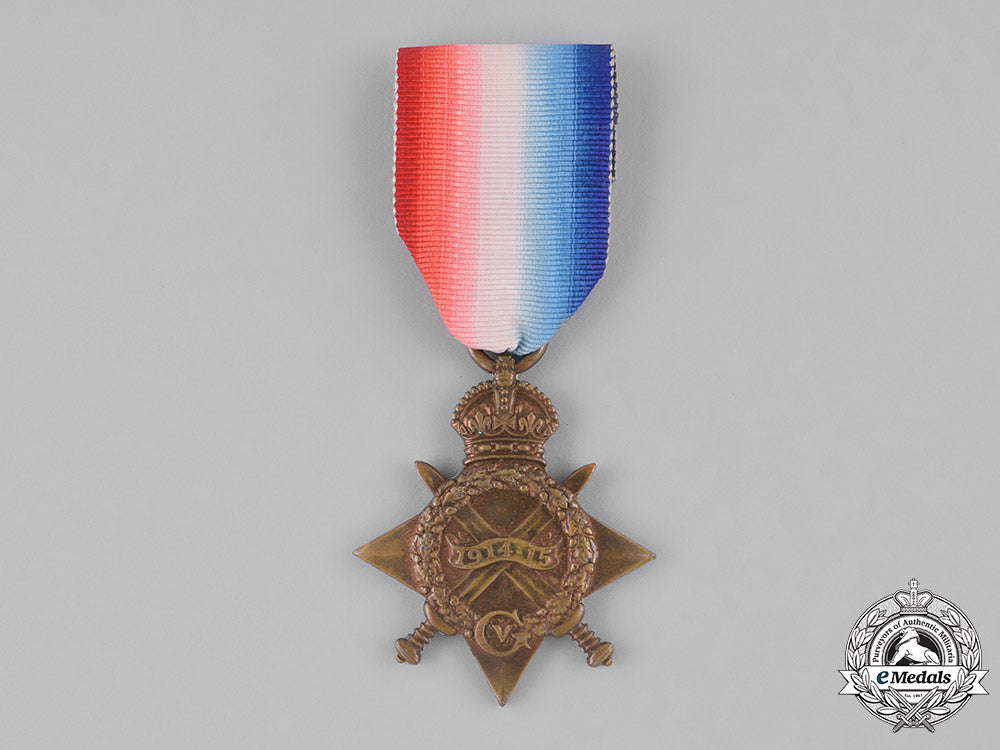
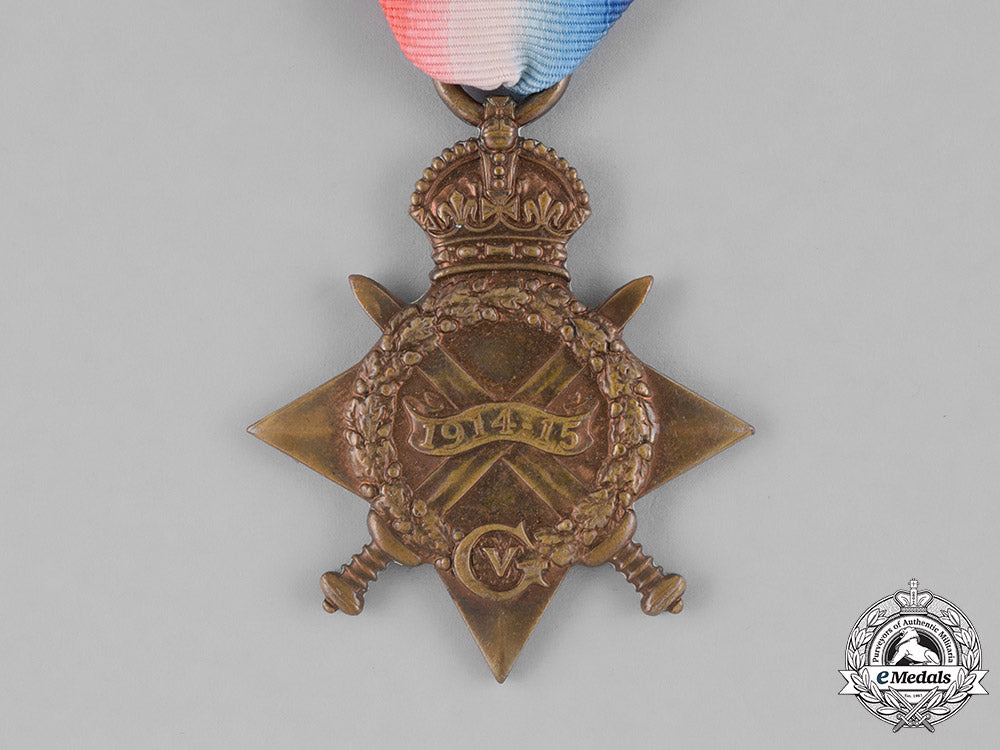
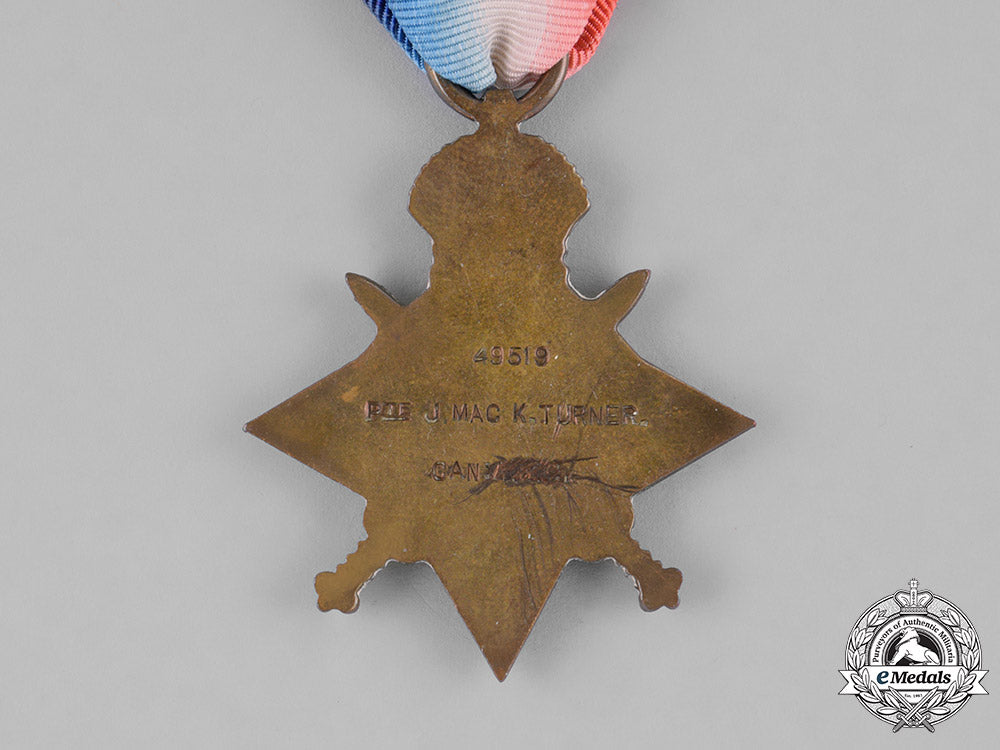
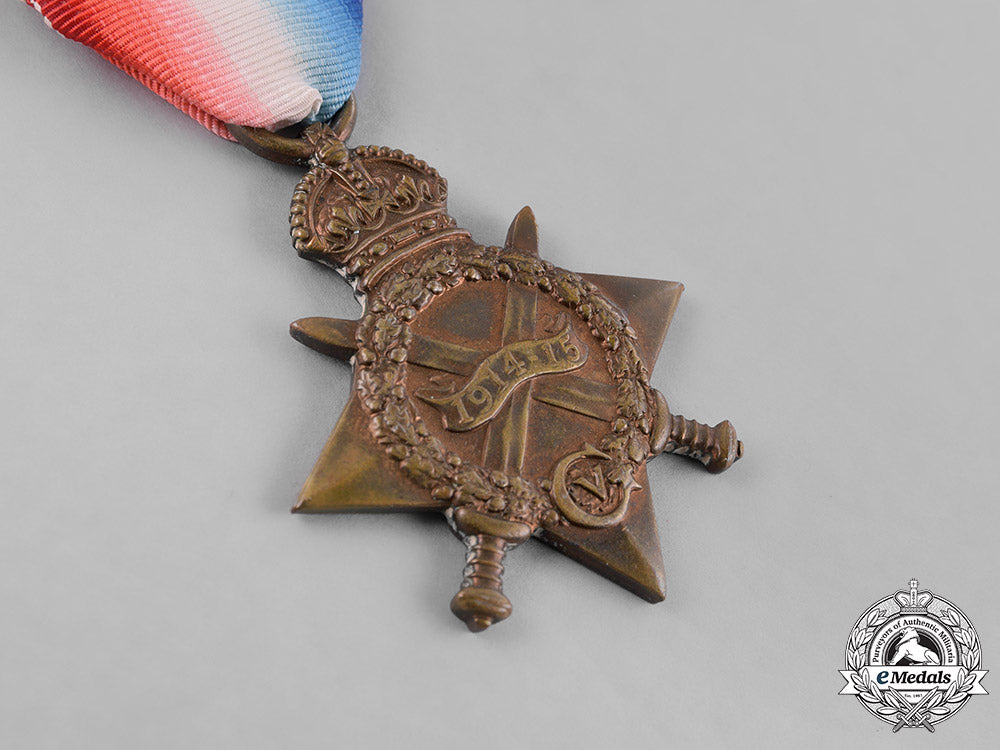
You May Also Like
Japan, Empire. A T90 Civil Defense Helmet, c.1943
W8287
Germany, SA. A Model 1933 Service Dagger, SA-Gruppe Nordsee, by Friedrich von der Kohlen
G59818
Germany, SA. A Model 1933 Service Dagger, SA-Gruppe Pommern, by Gustav Wirth
G59816
Germany, Third Reich. A Mixed Lot of Tyrolean Marksmanship Badges
G52930
Germany, SS. An Estonian Waffen-SS Volunteer’s Sleeve Shield
G50381
-
Japan, Empire. A T90 Civil Defense Helmet, c.1943
W8287
Add to CartRegular price $275 USDRegular price $0 USD Sale price $275 USDUnit price / per -
Germany, SA. A Model 1933 Service Dagger, SA-Gruppe Nordsee, by Friedrich von der Kohlen
G59818
Add to CartRegular price $980 USDRegular price $0 USD Sale price $980 USDUnit price / per -
Germany, SA. A Model 1933 Service Dagger, SA-Gruppe Pommern, by Gustav Wirth
G59816
Add to CartRegular price $980 USDRegular price $0 USD Sale price $980 USDUnit price / per -
Germany, Third Reich. A Mixed Lot of Tyrolean Marksmanship Badges
G52930
Add to CartRegular price $135 USDRegular price $0 USD Sale price $135 USDUnit price / per -
Germany, SS. An Estonian Waffen-SS Volunteer’s Sleeve Shield
G50381
Add to CartRegular price $150 USDRegular price $0 USD Sale price $150 USDUnit price / per
Do you have a similar item you are interested in selling?
Please complete the form and our client care representatives will contact you.
Sell Item












